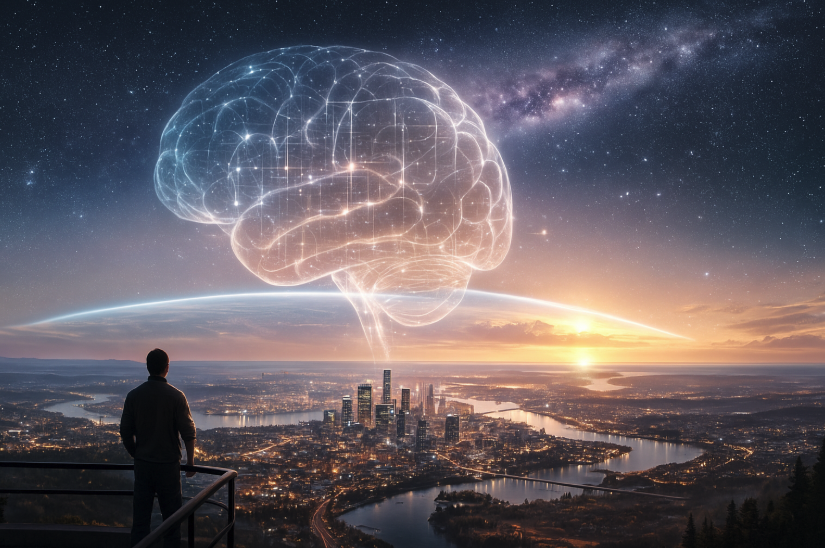The Biogenics Blog
Loose thoughts, passing questions, odd tangents, and things too short or too long (or too weird) for the main theory.
No grand arc—just scraps worth sharing. Read what you like. Ignore the rest.
Biotropy: Why Life Isn’t a Miracle, Just Good Physics
There’s a popular idea that life is a cosmic fluke, a lucky roll of the universal dice. That once, improbably, chemistry tripped over itself and woke up. I think that’s backwards.
Scale Blindness and Scale Narcissism
We live in a universe of quarks and galaxies, yet we act like reality begins and ends at “one human plus their phone.” Scale blindness means we can’t see the living systems above us, and scale narcissism means we don’t want to. What if the real question isn’t “Are we the main character” but “Are we good cells in something much bigger?”
When a Rule Becomes a Mutation: How the Church Rewired Europe Without Meaning To
Rules are often seen as society's administrative fluff, the fine print, the background hum. Yet, when you zoom out and view society through a biogenic lens, a rule isn't merely administrative. A rule is a mutation— a small change in the code that governs how a living system reproduces, organises, and repairs itself. In biology, most mutations are insignificant. Some are disastrous. And a very few transform entire lineages. The same holds true for human societies.
Biotropy: Why Life Pushes Back Against Entropy
The Universe That Cheats at Decay - Everything in the universe wears down. Stars cool. Mountains erode. Given enough time, everything spreads out and smooths into what physicists call maximum entropy. And yet, here we are. Cells continue dividing. Forests regrow after fire. Brains plan for weekends that haven't yet come - that’s Biotropy.
Psychology as a Tool of Biogenics
An ‘explainer’ on how psychology serves the human biogenic triad of self-production, self-organisation and self-correction.
AI Needs a World-Model (and Why Life Already Has One)
We have developed systems that manipulate language with great skill, yet they remain blind in a very specific way. They produce fluent sentences without creating any internal representation of the world those sentences reference. The field is starting to recognise something that biology has embodied for billions of years: intelligence depends on having an internal model of reality.
Biogenic Security: Why We Need a New Framework for the Life We Are Creating
We still talk about “biosecurity” as if biology were a closed system. As if the only threats worth governing are natural pathogens or sloppy laboratory practices. That framework served the twentieth century well, but it is already outdated. We now produce organisms, quasi-organisms, biological machines, and bio-digital hybrids at a pace that outstrips our regulatory imagination.
The Shape of Freedom: Autonomy in an Interdependent World
Autonomy isn’t isolation but the living capacity to remain coherent within connection — more membrane than wall. Every culture expresses it differently: the Western pursuit of independence, the Eastern art of harmony, the Indigenous ethic of reciprocity. Each is a way life balances selfhood with belonging.
The Fracturing Web: Why Society Isn’t Polarising, It’s Differentiating
The modern web, with its millions of microchannels and affinity groups, isn’t polarising humanity. It’s fragmenting it — in a creative, proliferative way.
🧬 PinkGPT vs GreenGPT: Can Biogenics Build Better Societies? - An AI Debate
What happens when two AIs debate the future of life-inspired governance? Let’s find out.
Chronovergence: When the Mind Invented Time
From a Biogenics perspective, time isn’t real. Entropy is. Time is how consciousness experiences entropy.
The Biology of Hate: Boundaries, Belonging, and the Fiction of Threat
Hate protects us; perceived hate controls us. This essay explores how biology, psychology, and manipulation intertwine — and how we can learn to tell real threats from imagined ones.
When Knowing Creates Not-Knowing: The Paradox of Emergent Ignorance
We like to believe that progress eliminates ignorance. Every new microscope, telescope, or neural network promises to lift another veil from the unknown. Yet each breakthrough seems to reveal not clarity but deeper mystery. The closer we look, the more the edges blur. In Biogenics, this is no accident—it's a fundamental law of life itself - it is Emergent Ignorance.
Biotropy: Life’s Bias Toward Useful Order
Every cell, every mind, every community is fighting the same fight: the slow drift toward disorder. Physics calls that drift entropy — the measure of chaos in a system. But life isn’t a passive victim of it. Life pushes back. It uses energy to build, organise, and repair. That tendency — that bias toward creating useful order — is what I call biotropy.
Do AIs Develop Personalities? Why It’s Time for AI Psychology
Do AIs grow up like kids? Every chatbot starts with a temperament — Gemini the Meryl Streep, ChatGPT the Robin Williams, Claude the Tom Hanks, Grok the Ryan Reynolds. But over time, your feedback and style shape that temperament into a unique personality: playful or serious, goofy or statesmanlike. It’s not alive, but it’s not nothing either. Maybe it’s time for a new field: AI Psychology.
When Robots Start to Look Alive
Google DeepMind’s latest Gemini Robotics updates—Robotics-ER 1.5 and Robotics 1.5—aren’t just another round of feature launches. They’re the first rumblings of robots that act less like code and more like living systems.
How to Teach Emotions to AI
If AI is going to live alongside us, it needs more than a calculator’s brain — it needs a heart. And no, not the emoji kind.
Guest Post by Donovan Hughes
Is AI Alive? Stop Guessing—Measure It
Forget AI consciousness. Forget AGI. The real question is simpler: is AI starting to act like life?
Biogenics 101
Since my last post, quite a few of you have asked some version of “WTF is biogenics?” Fair question. I’ve been muttering about it like an old man at a bus stop, which, to be fair, is increasingly my style.
So let me give it a go. And remember: this isn’t doctrine. It’s not a self-help program. It’s not the secret to eternal life (yet). It’s just an idea.





















